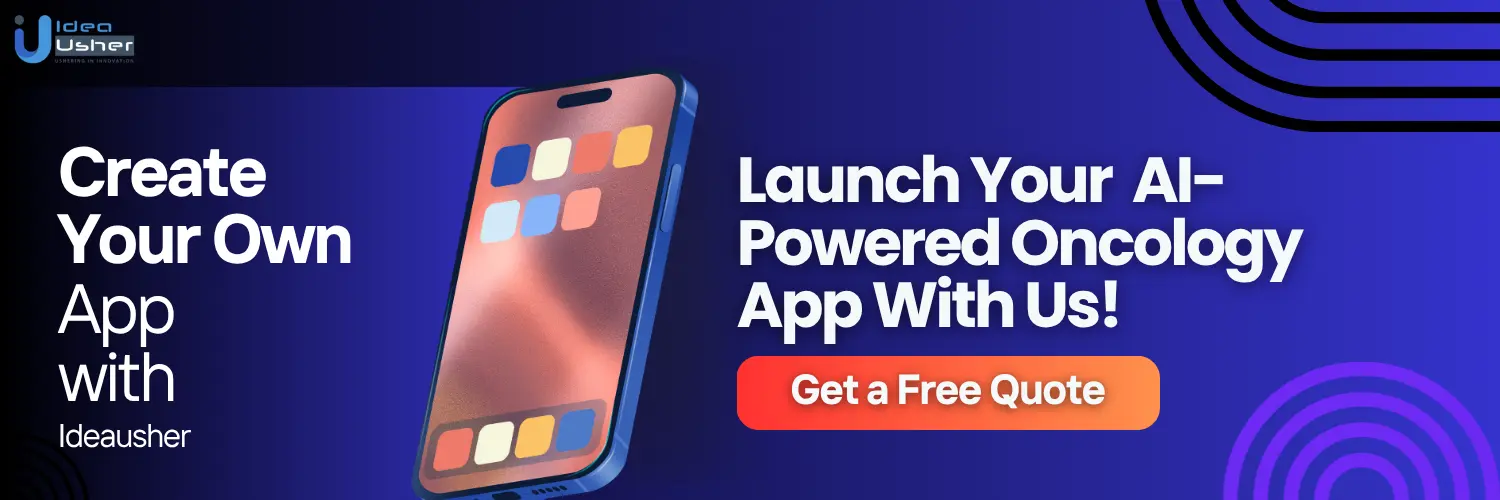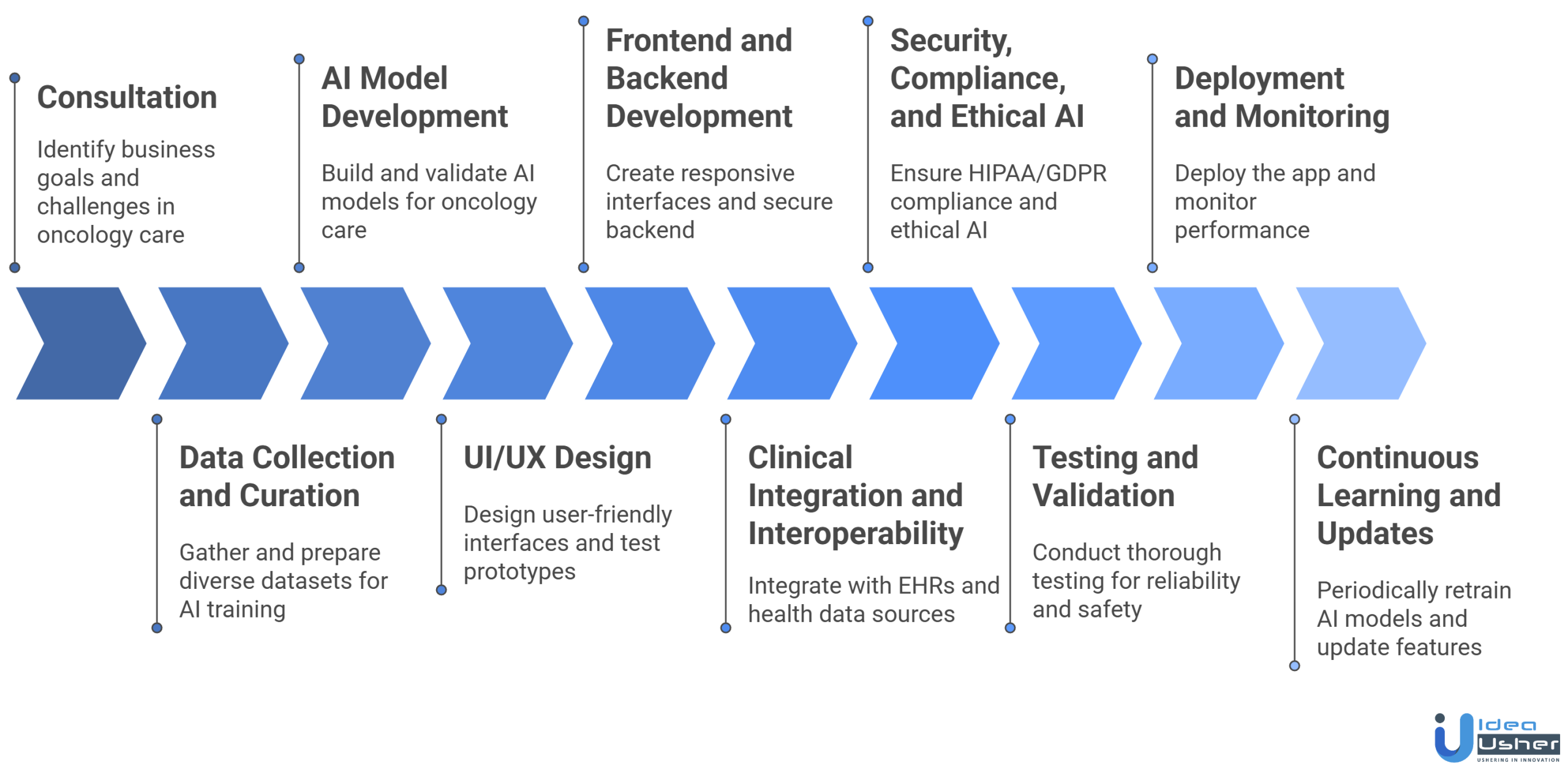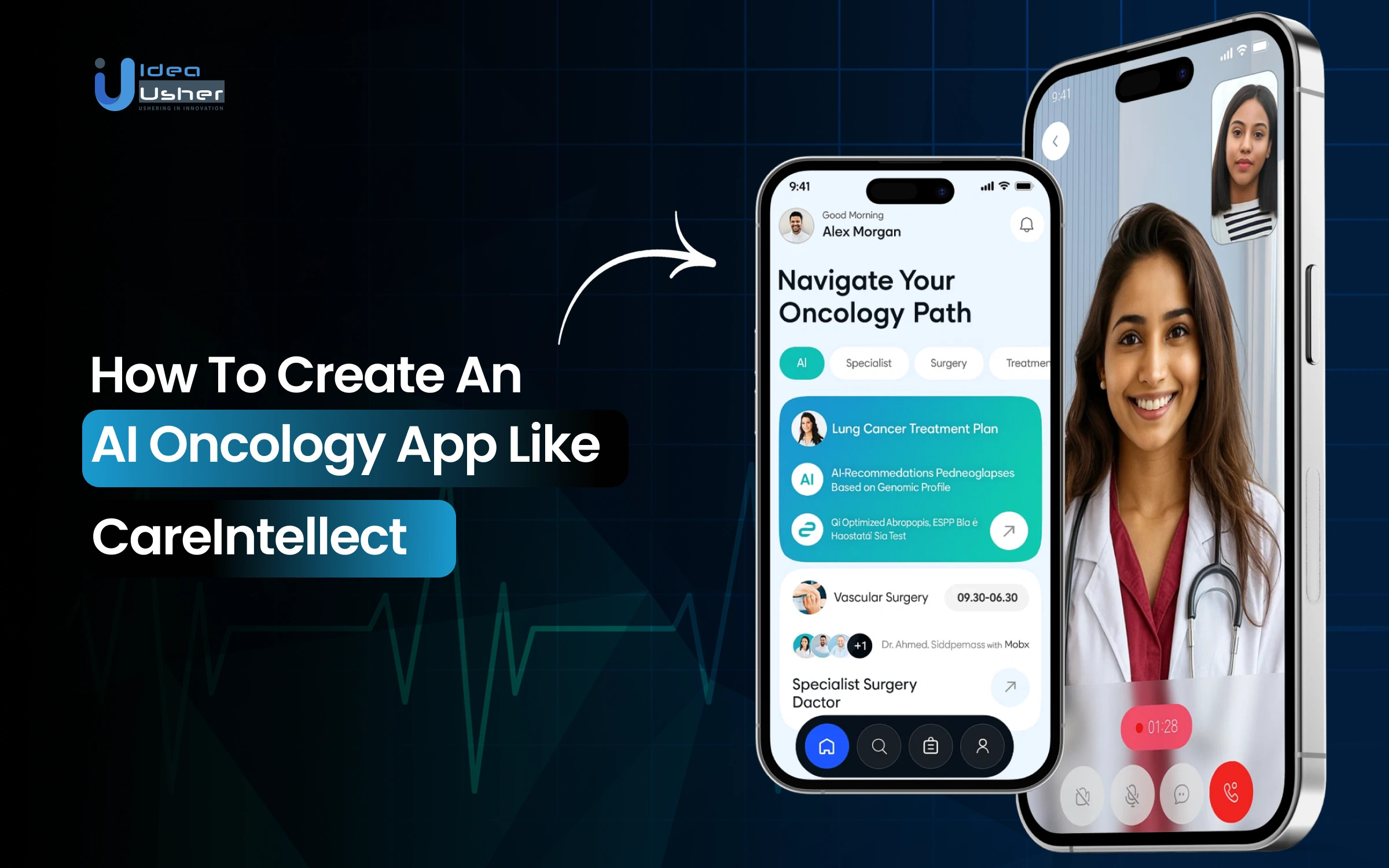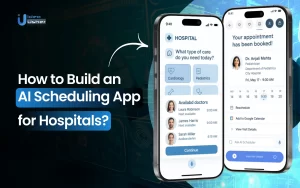Cancer diagnosis and treatment require accuracy, quick action, and ongoing attention. However, many healthcare systems face delays, scattered information, and specialists with heavy workloads. As a result, patients may experience late detection or uneven follow-up. An AI oncology app can help address these issues by using advanced algorithms and medical imaging to find patterns that people might miss. This leads to faster and more reliable insights for cancer care.
AI-powered platforms like CareIntellect are changing the way oncology is practiced. By bringing together medical imaging, pathology data, and patient history, these tools help clinicians make better and faster decisions. They can predict how a tumor might progress and suggest treatment options tailored to each patient, making data science a practical part of everyday care for oncologists.
In this blog, we’ll look at how to build an AI oncology app like CareIntellect. We’ll talk about its main features, the technology used, and the steps involved in creating a tool that combines innovation with patient care. We help healthcare enterprises build AI-driven solutions for market launch. At IdeaUsher, we help build an AI oncology platform that improves diagnosis accuracy, streamlines workflows, and creates real clinical impact.

What is an AI Oncology App, CareIntellect?
CareIntellect for Oncology is an AI-powered clinical tool from GE HealthCare designed to improve cancer care. It brings together patient data from different sources, like imaging, lab results, and clinical notes, into one place. With generative AI, it can summarize information, track how a disease is progressing, monitor if treatments are being followed, and recommend clinical trials. The platform first focuses on breast and prostate cancers, helping support personalized, data-driven decisions in oncology through a secure cloud system.
Business Model of CareIntellect for Oncology
CareIntellect for Oncology, a cloud-first, AI-powered application by GE HealthCare, integrates multi-modal patient data, uses generative AI to summarize clinical notes, and helps care teams track disease progression and optimize treatment across health networks.
The business model focuses on:
- Subscription-Based Access: Healthcare providers pay for CareIntellect access, activating additional applications as needed. This model offers scalability and adapts to healthcare system needs.
- Cloud Infrastructure: CareIntellect uses a shared data layer and AI to enable digital provisioning, upgrades, and licensing, plus an observability framework to detect and fix issues affecting uptime, performance, or security.
- Modular Application Deployment: Once a customer installs their first CareIntellect app, they can securely activate more without costly integration, saving time and resources usually spent on evaluating and maintaining new apps.
Revenue Model of CareIntellect for Oncology
CareIntellect’s oncology revenue model focuses on delivering value-driven care while generating sustainable income. The model is supported by multiple strategic revenue channels that ensure both growth and long-term impact:
- Subscription Fees: Healthcare providers pay annual or monthly fees for platform access, with prices based on users, data volume, or features.
- Per-User or Per-Usage Charges: Additional charges may apply depending on the number of clinicians or data volume, providing flexible pricing based on the healthcare provider’s scale.
- Add-On Modules: As CareIntellect expands to other areas, healthcare providers might face extra costs to activate modules, customizing the platform to their needs.
- Implementation and Support Services: GE HealthCare provides professional services for CareIntellect implementation, customization, and support, creating additional revenue.
Why CareIntellect Matters in Oncology?
CareIntellect transforms oncology care by providing clinicians with actionable insights from complex patient data. It empowers care teams to track disease progression, optimize treatments, and improve patient outcomes efficiently.
- A lot of patient data in hospitals goes unused or is hard to access because it’s scattered across systems and saved in many formats. This tool aims to extract more value from that data.
- It saves clinicians a lot of time that’s currently spent just trying to piece together what has happened with a patient.
- By proactively identifying deviations or missing steps, there is potential to improve patient outcomes through earlier interventions.
- It supports personalized cancer care by providing a comprehensive view of each patient’s treatment history, progression, and potential clinical trial options.
- The platform helps reduce errors and missed information by consolidating unstructured notes, lab results, and imaging reports into an easily accessible summary.
- It enhances collaboration among care teams, allowing oncologists, nurses, and other specialists to make coordinated decisions more efficiently.
How CareIntellect Drives Oncology Care?
CareIntellect consolidates patient data from multiple sources into a unified view and leverages AI to generate insights, helping care teams monitor progress, detect deviations, and guide treatment decisions effectively.

1. Data Aggregation
CareIntellect consolidates patient data from EHRs, imaging, labs, notes, and genomics, providing clinicians with a complete, accurate view of medical history without navigating multiple systems.
2. Data Harmonization
Once collected, the platform uses AI algorithms to standardize data. Unstructured info like physician notes or scans is converted into a consistent format, enabling accurate interpretation regardless of source or format.
3. Clinical Summarization
CareIntellect produces concise AI summaries of each patient’s medical history, highlighting diagnosis, treatment history, disease progression, and test results. These summaries enable clinicians to quickly grasp a patient’s status without reviewing hundreds of documents.
4. Disease Progression Tracking
The platform continuously monitors patient data over time, enabling longitudinal tracking of disease progression. Identifying trends, deviations, or changes in the patient’s condition allows clinicians to intervene earlier if treatment outcomes are not as expected.
5. Clinical Trial Matching
CareIntellect leverages patient clinical and genomic data to identify relevant clinical trials. By comparing patient profiles with trial inclusion and exclusion criteria, the system helps oncologists find opportunities for cutting-edge treatments that may be suitable for the patient.
6. Treatment Adherence Monitoring
The platform tracks adherence to prescribed treatment plans, alerting care teams to missed tests, appointments, or protocol deviations. This proactive monitoring ensures that patients remain on their optimal treatment path, improving outcomes and reducing risks.
7. Decision Support
Based on the aggregated and analyzed data, CareIntellect provides clinicians with actionable insights, such as recommendations for next steps in treatment, alerts for missing information, or potential clinical trials. These insights support faster, more informed clinical decision-making.
8. User Interface
All the information is presented via an intuitive, user-friendly dashboard, allowing clinicians to access patient summaries, treatment histories, and AI insights at a glance. The interface is designed to streamline workflows and reduce the time spent navigating multiple systems.
9. Cloud-Based Accessibility
As a cloud-based platform, CareIntellect offers secure, real-time access to patient data from anywhere. This enables collaborative care across teams and locations, ensuring that critical insights are always available when needed.

The Rise of AI Oncology Apps in Healthcare
The global AI in oncology market was valued at USD 4.18 billion in 2024 and is projected to reach USD 19.17 billion by 2030, with a CAGR of 26.17%. This growth is driven by advancements in AI diagnostics, personalized treatment, and machine learning in cancer research.

The increasing demand for AI-driven solutions in oncology has attracted significant investment:
- CareIntellect: GE HealthCare unveiled CareIntellect for Oncology, a cloud-first application utilizing generative AI to integrate multi-modal patient data into a unified, actionable view.
- Outcomes4Me: In May 2025, Outcomes4Me closed a $21 million Series B funding round, led by Salica Investments, bringing its total equity raised to approximately $38 million.
- Hippocratic AI: Hippocratic AI secured $141 million in a Series B funding round, achieving a valuation of $1.64 billion, to advance its AI-driven healthcare solutions.
Why You Should Invest in AI Oncology Apps?
Investing in AI oncology apps allows participation in a transformative healthcare shift, with technological advances promising better patient outcomes and early investment returns.
- High Impact on Patient Care: AI enhances diagnostic accuracy, predicts treatment responses, and personalizes cancer care, addressing critical gaps in oncology.
- Attractive Funding Environment: Startups like Outcomes4Me and Hippocratic AI demonstrate strong investor confidence, making this sector ripe for strategic investments.
- Innovation-Driven Growth: Advancements in generative AI, machine learning, and multi-modal data integration create opportunities for scalable, next-generation healthcare solutions.
- Long-Term Sustainability: AI oncology apps can reduce healthcare costs, optimize treatment pathways, and improve clinical outcomes, ensuring long-term relevance and adoption.
- First-Mover Advantage: Early investors in AI oncology technology can gain a competitive edge in a market poised for rapid expansion and technological disruption.
The rise of AI oncology app development is revolutionizing cancer care by enhancing diagnostic accuracy, personalizing treatment plans, and improving patient outcomes. With substantial investments fueling innovation, AI is poised to play a pivotal role in the future of oncology.
How AI Is Revolutionizing Cancer Care?
Artificial intelligence is transforming cancer care by enabling faster, more accurate diagnoses and personalized treatment plans. By analyzing vast amounts of medical data, AI helps doctors make smarter decisions and improve patient outcomes.
1. Early Cancer Detection and Screening
AI enables earlier diagnosis by analyzing medical images with exceptional accuracy. For instance, a Nature Medicine study found that Google Health’s AI detected breast cancer 9.4% more accurately than radiologists. Such precision reduces false negatives and ensures patients receive treatment sooner, improving survival rates.
2. Personalized Treatment Planning
AI helps oncologists design treatments tailored to each patient’s genetic and molecular profile. Algorithms assess tumor behavior, drug response, and genetic mutations to recommend the most effective therapies. This precision approach minimizes side effects and enhances overall recovery outcomes.
3. Accelerated Drug Discovery
AI-powered models drastically shorten drug discovery cycles by identifying promising compounds and simulating their effects. According to McKinsey, AI can reduce early-stage drug discovery time by up to 70% and cut costs by 50%, helping bring new cancer therapies to patients faster.
4. Predictive Analytics for Patient Outcomes
Machine learning predicts disease progression, recurrence, and treatment success by analyzing clinical and genomic data. Hospitals use predictive models to monitor high-risk patients in real-time, allowing timely intervention and better long-term survival rates.
5. Enhancing Pathology and Radiology
AI tools now assist pathologists in analyzing tissue samples and radiology scans with precision. The FDA has approved several AI-based pathology systems, such as Paige.AI, which improved prostate cancer detection accuracy by over 10% compared to manual review.
6. Improving Clinical Decision Support
AI-driven dashboards help clinicians interpret complex data quickly, guiding evidence-based decisions. Integrated with EHR systems, these tools suggest treatment paths, dosage adjustments, and follow-up plans, ultimately enhancing care coordination and reducing errors.
Key Features of an AI Oncology App Like CareIntellect
An AI oncology app development like CareIntellect empowers oncologists, researchers, and patients with data-driven insights, precision treatment recommendations, and intelligent workflow automation. It combines clinical data, medical imaging, genomics, and AI to redefine cancer diagnosis and care delivery.

1. AI-Powered Cancer Detection and Diagnosis
The app uses deep learning models trained on radiology scans and tissue images to help find tumors early. AI highlights areas that might be cancer, measures tumor size, and helps classify cancer types with accuracy close to that of experts. This speeds up diagnosis and gives specialists more confidence in their decisions.
2. Predictive Treatment Outcome Modeling
AI models look at patient history, biomarkers, and how patients have responded to treatments to predict how someone might react to options like chemotherapy, immunotherapy or targeted drugs. This helps doctors tailor treatment plans, reduce side effects, and improve survival chances.
3. Genomic Data Integration for Precision Oncology
The platform integrates multi-modal data like electronic health records, imaging, labs, clinical notes, and genomics for a comprehensive patient profile. AI identifies cancer-linked mutations and gene markers, connecting them to clinical trial and drug response data to enable truly personalized treatment recommendations.
4. Oncology Decision Support System (DSS)
An embedded AI DSS provides oncologists with real-time, evidence-based recommendations during patient consultations. It brings together clinical guidelines (like NCCN or ASCO), past case results, and current patient information. This helps doctors make informed, best-practice decisions with direct support from AI.
5. Automated Medical Imaging Analysis
AI models automate the segmentation, annotation, and comparison of radiology and pathology images over time. This makes it easier to track tumor progression and how well treatments are working. Automation also lightens the workload for radiologists and helps keep reports accurate and consistent.
6. Clinical Trial Matching Engine
The app uses AI to review current clinical trials and automatically match patients who qualify based on their genetics, background, and health details. This speeds up trial enrollment and helps more advanced cancer patients access new treatments.
7. Personalized Care Pathway Management
Patients get a care plan that updates in real time with appointments, medication schedules, nutrition advice, and progress tracking. AI keeps adjusting these recommendations based on treatment response and real-time health metrics. This helps patients, doctors, and caregivers stay connected and work together.
8. Predictive Analytics for Risk Stratification
AI models evaluate population health data to identify high-risk patients or predict recurrence probability after treatment. Early interventions can then be designed, improving survival outcomes and reducing hospital readmissions.
9. Secure Data Interoperability
The platform uses FHIR and HL7 standards so it can easily share data with electronic health records, labs, and hospital databases. This way, oncologists, labs, and patients all have secure, real-time access to accurate information.
10. Privacy & Ethical AI Layer
The platform uses HIPAA-compliant encryption, anonymizes data for AI training, and provides clear explanations for AI recommendations to protect sensitive oncology data. This approach builds trust, ensures transparency, and helps clinics meet regulatory standards.

Development Process of an AI Oncology App Like CareIntellect
An AI oncology app development requires a meticulous, multi-layered approach that balances clinical accuracy, AI intelligence, patient safety, and regulatory compliance. Below is a step-by-step development process highlighting key phases:

1. Consultation
We consult with you to identify business goals and challenges in oncology care. Our developers define essential AI features, such as imaging analysis and predictive modeling, ensuring the app supports your vision and delivers valuable, clinically relevant solutions to your users.
2. Data Collection and Curation
Our developers collect and curate diverse datasets, including scans, reports, and outcomes. We clean, anonymize, and annotate data to train robust, unbiased AI models, ensuring high clinical accuracy and relevance for oncology diagnostics and treatment planning.
3. AI Model Development
Our developers build and validate AI models for tumor detection, outcome prediction, and clinical support. These models are trained on curated data, enabling precision diagnostics and personalized recommendations for oncology care while ensuring accuracy, reliability, and safety.
4. UI/UX Design and Prototyping
We design dashboards for oncologists, patients, and caregivers. Our developers test prototypes for usability, ensuring oncology data and AI insights are clear and actionable. Good UX encourages adoption and simplifies clinical decision-making.
5. Frontend and Backend Development
Our developers create responsive web and mobile interfaces, with a backend for data processing, AI integration, and secure storage. Scalable architecture ensures reliable performance, supports multiple users, and delivers real-time AI insights for oncology care.
6. Clinical Integration and Interoperability
Our developers integrate the app with EHRs, lab systems, and health data sources via HL7 and FHIR standards. This supports seamless data flow, patient tracking, and multi-source analysis, ensuring clinicians have access to comprehensive, up-to-date information for oncology care.
7. Security, Compliance, and Ethical AI
We ensure HIPAA/GDPR-compliant encryption, secure authentication, and explainable AI models. Our developers prioritize ethical AI for transparent decisions and data protection, building user trust and meeting regulatory demands in oncology app development.
8. Testing and Validation
Our developers conduct thorough functional, performance, and AI validation testing. Clinical validation with oncologists ensures AI recommendations align with real-world protocols. This rigorous testing guarantees reliability and safety before the app’s deployment in oncology care.
9. Deployment and Monitoring
We deploy the app on cloud or hospital servers. Our developers monitor AI performance, app stability, and user engagement continuously, quickly addressing any issues to ensure ongoing effectiveness and responsiveness of the oncology platform.
10. Continuous Learning and Updates
Our developers periodically retrain AI models with new data and research. We roll out feature updates and UX improvements, ensuring the app evolves with oncology advancements and remains clinically relevant and innovative over time.
Cost to Build an AI Oncology App
An AI oncology app development like CareIntellect involves advanced AI, sensitive healthcare data, and regulatory compliance. The cost varies depending on the complexity of features, AI integration, and clinical interoperability.
| Development Phase | Description | Estimated Cost |
| Consultation | Defining business goals, AI objectives, oncology requirements, and project scope. | $5,000 – $8,000 |
| Data Collection and Curation | Collecting anonymized clinical and research data for compliant AI training. | $10,000 – $18,000 |
| AI Model Development | Build, train, and tune AI models for oncology predictions, treatment, and personalized care. | $18,000 – $32,000 |
| UI/UX Design and Prototyping | Designing user-friendly interfaces and workflows for patients, clinicians, and administrators. | $7,000 – $12,000 |
| Frontend and Backend Development | Building frontend and backend, including databases, APIs, and AI integration. | $15,000 – $27,000 |
| Clinical Integration and Interoperability | Integrating with EHRs, labs, and hospital platforms using secure standards. | $6,000 – $10,000 |
| Security, Compliance, and Ethical AI | Implementing HIPAA/GDPR-compliant security, encrypted storage, authentication, and ethical AI. | $9,000 – $17,000 |
| Testing and Validation | Conducting functional, performance, and clinical validation tests to ensure AI accuracy, app stability, and patient safety. | $4,000 – $8,000 |
| Deployment and Monitoring | Deploying to cloud servers and monitoring uptime, AI, and engagement. | $4,000 – $7,000 |
| Continuous Learning and Updates | Regular updates and enhancements based on feedback and new oncology data. | $3,000 – $5,000 |
Total Estimated Cost: $65,000 – $140,000
Note: This is an estimated cost breakdown to provide a clear understanding of the investment required for AI oncology app development. Consult with IdeaUsher for tailored guidance and development support to bring your platform vision to life.

Recommended Tech Stack
These are some of the recommended tech stacks for AI oncology app development that will enhance the app’s features for users and doctors.
- Frontend: Frameworks like React, Angular, or Flutter are used to build responsive, intuitive, and accessible interfaces for both web and mobile platforms. Flutter allows cross-platform development for iOS and Android, ensuring consistent user experience.
- Backend: Node.js or Django can handle secure, scalable, and high-performance backend operations. They manage APIs, user authentication, data processing, and AI integration efficiently.
- AI/ML Frameworks: Frameworks such as TensorFlow, PyTorch, and scikit-learn are ideal for developing oncology-focused AI models, predictive analytics, and personalized treatment recommendations.
- Database: PostgreSQL is used for structured clinical and patient data, while MongoDB handles unstructured datasets like medical research, imaging data, and AI training datasets.
- Integration & Interoperability: Standards like HL7 and FHIR along with RESTful APIs and middleware enable seamless connectivity with EHR systems, labs, and hospital platforms, ensuring secure data exchange.
- Cloud & Security: Cloud platforms such as AWS, Azure, or Google Cloud provide HIPAA/GDPR-compliant infrastructure. Features include encryption, secure authentication, automated backups, and scalable compute resources.
- Testing & Monitoring Tools: Tools like Selenium, Postman, New Relic, and Datadog are used for functional testing, API validation, real-time monitoring, and performance optimization of the app.
Challenges & How to Overcome Those?
An AI oncology app development like CareIntellect involves complex medical workflows, sensitive patient data, and high expectations for clinical accuracy. Below are the key challenges and strategies to address them effectively:
1. Access to High-Quality, Diverse Data
Challenge: AI models require large datasets of radiology scans, pathology reports, and genomic data. Accessing high-quality, annotated, and diverse datasets can be difficult.
Solution: We leverage publicly available, de-identified datasets and synthetic data generation techniques to train AI models. All data is carefully cleaned, annotated, and curated to ensure accurate and unbiased model performance.
2. Ensuring AI Accuracy and Reliability
Challenge: Predicting treatment outcomes and detecting tumors require highly accurate AI models. Errors can have serious consequences.
Solution: We develop robust deep learning and machine learning models, validated against historical patient data and clinical guidelines. Continuous feedback loops improve model accuracy over time.
3. Integrating with Clinical Workflows
Challenge: Clinicians need the app to fit seamlessly into their existing workflows without causing disruption.
Solution: We design the platform for EHR integration via FHIR/HL7 standards, provide intuitive dashboards, and deliver actionable AI insights that complement clinical decision-making.
4. Handling Complex Genomic and Imaging Data
Challenge: Integrating and interpreting genomic sequences and imaging data is technically challenging.
Solution: We leverage AI pipelines and advanced data processing frameworks to analyze multi-modal data and deliver clinically actionable insights in an understandable format.
5. Interpretability of AI Predictions
Challenge: Oncologists need to understand why the AI made a specific recommendation; black-box models can reduce trust.
Solution: We implement explainable AI (XAI) models that provide clear reasoning and visualizations for predictions, ensuring clinicians can make informed decisions with confidence.
Conclusion
Building an AI oncology app requires a careful balance of advanced technology, clinical expertise, and user-focused design. From managing patient data securely to providing actionable insights for physicians, every element plays a crucial role. By following a structured approach to AI oncology app development, healthcare providers can create tools that improve care efficiency, support better outcomes, and enhance patient experiences. Investing in thoughtful development ensures that the platform not only meets medical standards but also delivers meaningful value to patients, doctors, and the broader healthcare ecosystem.
Why Choose IdeaUsher for Your AI Oncology App Development?
At IdeaUsher, we specialize in building AI-driven healthcare solutions that enhance patient care and optimize clinical workflows. Our team ensures your AI oncology app is secure, accurate, and user-friendly, helping healthcare providers deliver better outcomes.
Why Work with Us?
- Healthcare & AI Expertise: We integrate advanced AI models with healthcare compliance standards for precision and reliability.
- Custom Solutions: From concept to deployment, we deliver fully tailored platforms for oncology care.
- Data Security & Compliance: We prioritize HIPAA and other regulatory requirements to ensure patient data safety.
- Scalable Architecture: We build apps designed to grow with your practice and patient needs.
Explore our portfolio to see how we’ve transformed healthcare ideas into functional, impactful AI solutions.
Reach out today for a free consultation and start your AI oncology app journey.
Work with Ex-MAANG developers to build next-gen apps schedule your consultation now
FAQs
An AI oncology app should include patient data management, real-time diagnostics, personalized treatment recommendations, appointment scheduling, and integration with medical devices. These features help streamline clinical workflows and improve patient care efficiency.
AI analyzes patient data and medical imaging to provide precise diagnostics, predict treatment responses, and recommend personalized care plans. This reduces errors, enhances decision-making, and allows clinicians to offer more effective cancer treatments.
Robust encryption, secure cloud storage, and strict access controls are essential. The app must comply with HIPAA and other regulations to protect sensitive patient information while enabling safe, real-time access for healthcare professionals.
Yes, through APIs and HL7/FHIR standards, AI oncology apps can integrate with EHRs and lab systems. This ensures seamless data flow, reduces duplication, and allows clinicians to access accurate patient information instantly.

























